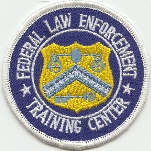Located within the Department of Homeland Security (DHS), the Federal Law Enforcement Training Center (FLETC) is the largest law enforcement training center in the country. It provides teaching and vocational instruction to a wide range of law enforcement and security personnel at the federal, state and local government level. Demand for FLETC’s services has risen dramatically in the wake of 9/11, prompting the center’s leadership to add a dozen new programs to combat terrorism.
During the late 1960s, law enforcement studies indicated it was time for the federal government to establish a centralized training program for federal law enforcement officers and agents. With no such center in place, the quality of training varied from agency to agency, thanks to inadequate facilities and duplication of effortcaused by each agency independently training its own personnel. Congress then acted to create for the first time a program that would address the training needs of all federal law enforcement operations.
- Commercial Vehicle Counterterrorism Training Program
- Crisis Management Training Program - which includes a course on how to deal with “Animal Environmental Rights Extremists”
- Critical Incident Response Training Program
- Critical Infrastructure Protection Training Program
- Fundamentals of Terrorism Training Program - which includes the courses “Implications of Jihad” and “Assassinations”
- Land Transportation Antiterrorism Training Program
- OPSEARIONS Security for Public Safety Agencies Counterterrorism Training Program
- Physical Security Training Program
- Protective Service Operations Training Program
- Suicide Bomber Mitigation Training Program - which includes the course “Inside the Mind of a Suicide Bomber”
- Weapons of Mass Destruction Training Program
- Department of Agriculture
- Department of Commerce
- Department of Defense
- Department of Education
- Department of Energy
- Department of Health and Human Services
- Department of Homeland Security
- Citizenship and Immigration Services
- Federal Air Marshal Service
- Federal Emergency Management Agency, Office of Security
- Federal Protective Service
- Office of Inspector General
- Transportation Security Administration
- U.S. Border Patrol
- U.S. Coast Guard
- U.S. Customs and Border Protection
- U.S. Immigration and Customs Enforcement
- U.S. Secret Service
- Department of Housing and Urban Development
- Office of Inspector General
- Protective Services Division
- Department of the Interior
- Department of Justice
- Department of Labor
- Department of State
- Department of Transportation
- Department of the Treasury
- Department of Veterans Affairs
- Legislative Branch
- Judicial Branch
- Independent Agencies, Government Corporations and Commissions
- Amtrak Police, National Railroad Passenger Corporation
- Central Intelligence Agency, Office of Security
- Central Intelligence Agency, Office of Inspector General
- Corporation for National and Community Service, Office of Inspector General Environmental Protection Agency, Criminal Investigation Division
- Environmental Protection Agency, Office of Inspector General
- Federal Deposit Insurance Corporation, Office of Inspector General
- General Services Administration, Office of Inspector General
- National Aeronautics and Space Administration, Office of Inspector General
- Nuclear Regulatory Commission, Office of Inspector General
- Office of Personnel Management, Office of Inspector General
- Railroad Retirement Board, Office of Inspector General
- Small Business Administration, Office of Inspector General
- Social Security Administration, Office of Inspector General
- Tennessee Valley Authority, Office of Inspector General
- Tennessee Valley Authority Police
- U.S. Agency for International Development, Office of Inspector General
- U.S. Postal Service, Office of Inspector General
- Quasi-Official Agencies
FLETC Struggling with Demand in post-9/11 World
- Table of Contents
- Overview
- History
- What it Does
- Where Does the Money Go
- Controversies
- Suggested Reforms
- Comments
- Leave a comment


- Latest News
- D.C. Public Schools will Teach all Second-Graders to Ride a Bike
- New Rule in Germany Limits Sales of Sex-Themed E-Books to 10pm to 6am
- What Happened to the 6-Year-Old Tibetan Boy the Chinese Government Kidnapped 20 Years Ago?
- U.S. Ambassador to Turkey Photoshops his Hair Color to Mock Turkish Mayor
- Mystery Artist Calls Attention to Unfixed Potholes by Drawing Penises around Them
Located within the Department of Homeland Security (DHS), the Federal Law Enforcement Training Center (FLETC) is the largest law enforcement training center in the country. It provides teaching and vocational instruction to a wide range of law enforcement and security personnel at the federal, state and local government level. Demand for FLETC’s services has risen dramatically in the wake of 9/11, prompting the center’s leadership to add a dozen new programs to combat terrorism.
During the late 1960s, law enforcement studies indicated it was time for the federal government to establish a centralized training program for federal law enforcement officers and agents. With no such center in place, the quality of training varied from agency to agency, thanks to inadequate facilities and duplication of effortcaused by each agency independently training its own personnel. Congress then acted to create for the first time a program that would address the training needs of all federal law enforcement operations.
- Commercial Vehicle Counterterrorism Training Program
- Crisis Management Training Program - which includes a course on how to deal with “Animal Environmental Rights Extremists”
- Critical Incident Response Training Program
- Critical Infrastructure Protection Training Program
- Fundamentals of Terrorism Training Program - which includes the courses “Implications of Jihad” and “Assassinations”
- Land Transportation Antiterrorism Training Program
- OPSEARIONS Security for Public Safety Agencies Counterterrorism Training Program
- Physical Security Training Program
- Protective Service Operations Training Program
- Suicide Bomber Mitigation Training Program - which includes the course “Inside the Mind of a Suicide Bomber”
- Weapons of Mass Destruction Training Program
- Department of Agriculture
- Department of Commerce
- Department of Defense
- Department of Education
- Department of Energy
- Department of Health and Human Services
- Department of Homeland Security
- Citizenship and Immigration Services
- Federal Air Marshal Service
- Federal Emergency Management Agency, Office of Security
- Federal Protective Service
- Office of Inspector General
- Transportation Security Administration
- U.S. Border Patrol
- U.S. Coast Guard
- U.S. Customs and Border Protection
- U.S. Immigration and Customs Enforcement
- U.S. Secret Service
- Department of Housing and Urban Development
- Office of Inspector General
- Protective Services Division
- Department of the Interior
- Department of Justice
- Department of Labor
- Department of State
- Department of Transportation
- Department of the Treasury
- Department of Veterans Affairs
- Legislative Branch
- Judicial Branch
- Independent Agencies, Government Corporations and Commissions
- Amtrak Police, National Railroad Passenger Corporation
- Central Intelligence Agency, Office of Security
- Central Intelligence Agency, Office of Inspector General
- Corporation for National and Community Service, Office of Inspector General Environmental Protection Agency, Criminal Investigation Division
- Environmental Protection Agency, Office of Inspector General
- Federal Deposit Insurance Corporation, Office of Inspector General
- General Services Administration, Office of Inspector General
- National Aeronautics and Space Administration, Office of Inspector General
- Nuclear Regulatory Commission, Office of Inspector General
- Office of Personnel Management, Office of Inspector General
- Railroad Retirement Board, Office of Inspector General
- Small Business Administration, Office of Inspector General
- Social Security Administration, Office of Inspector General
- Tennessee Valley Authority, Office of Inspector General
- Tennessee Valley Authority Police
- U.S. Agency for International Development, Office of Inspector General
- U.S. Postal Service, Office of Inspector General
- Quasi-Official Agencies
FLETC Struggling with Demand in post-9/11 World
Comments


- Latest News
- D.C. Public Schools will Teach all Second-Graders to Ride a Bike
- New Rule in Germany Limits Sales of Sex-Themed E-Books to 10pm to 6am
- What Happened to the 6-Year-Old Tibetan Boy the Chinese Government Kidnapped 20 Years Ago?
- U.S. Ambassador to Turkey Photoshops his Hair Color to Mock Turkish Mayor
- Mystery Artist Calls Attention to Unfixed Potholes by Drawing Penises around Them





Comments